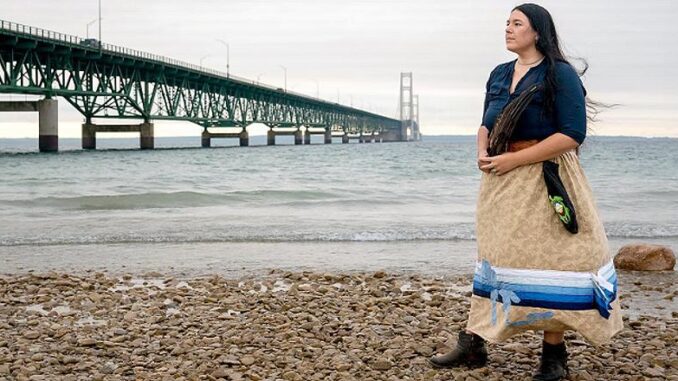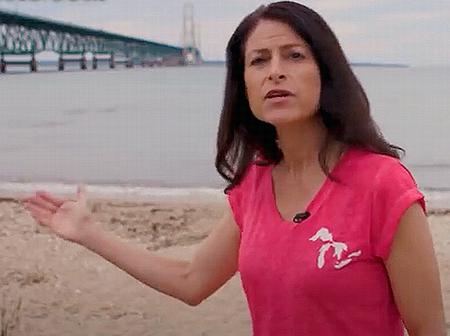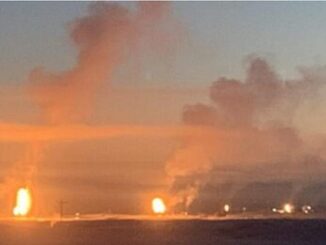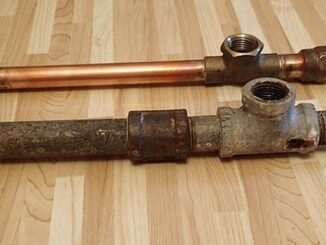
LANSING, Michigan, October 7, 2023 (ENS) – A coalition of more than 60 Tribal Nations from across the U.S. Midwest and Canada, led by the Bay Mills Indian Community, has weighed in on Michigan Attorney General Dana Nessel’s lawsuit to remove the Line 5 oil pipeline from the heart of the Great Lakes. Line 5 is an outdated oil-and-gas pipeline that the Tribes warn poses an oil spill risk particularly in a four-mile section of the Straits of Mackinac known as the dual pipelines.
The Straits of Mackinac is the connecting waterway between Lake Michigan and Lake Huron of the Great Lakes, the largest freshwater system on Earth.
The Tribes submitted an amicus brief supporting Nessel’s claims and asking the U.S. Court of Appeals for the 6th Circuit to remand Nessel v. Enbridge to state court, a move opposed by the Canadian energy giant Enbridge, which owns Line 5. Headquartered in Calgary, Alberta, Enbridge owns and operates pipelines throughout Canada and the United States, transporting crude oil, natural gas, and natural gas liquids.
“Near and far, Anishinaabe people have united to protect the Great Lakes,” said President Whitney Gravelle of the Bay Mills Indian Community. “We stand behind Attorney General Nessel because we know that shutting down Line 5 is the only way to protect everyone who depends on the land, water, and natural resources within the Great Lakes, including Anishinaabe people exercising our treaty rights.”
Not only do the Great Lakes provide drinking water to more than 40 million people, but in the creation stories of the Anishinaabe, the Straits of Mackinac are where the Great Turtle emerged after a flood to create the North American continent, which the Anishinaabe refer to as “Turtle Island.”
Enbridge Plans a Tunnel to Relocate Line 5
But now Enbridge is planning for their Great Lakes Tunnel Project – a tunnel to be bored deep under the Straits of Mackinac that would house a replacement segment of Line 5, as well as “the multiple safety measures we take to ensure safety in the Straits,” the Canadian company said in a statement.
Enbridge has signed three agreements with the State of Michigan, culminating in a commitment to build the tunnel to house a replacement segment of Line 5 at the Straits. The validity of these agreements has been affirmed through a Court of Claims decision, and in 2019 Enbridge spent $40 million on a geotechnical investigation program and other pre-design engineering work to determine the tunnel’s design.
Enbridge President and CEO Al Monaco told the Canada-United States Business Association in October 2019, “We will replace the pipelines on the bottom of the Straits, and we will do this as quickly and as safely as possible.”
“Line 5 is a critical source of 540,000 barrels per day of propane and crude oil supply for Michigan and surrounding areas, and its shutdown would lead to a serious disruption of the energy market,” Enbridge says on its website.
Line 5 serves an estimated 55 percent of the state’s propane needs, including 65 percent of the propane used in the Upper Peninsula and northern Michigan. Line 5 also feeds refineries in Detroit and Toledo that supply more than half of all aviation fuel consumed at Detroit Metropolitan Airport is refined in Toledo from Line 5 crude. If Line 5 shuts down, so will the refinery,” Enbridge says.

Yet the Tribal Nations have an interest in conservation of the Mackinac Straits that stretches far back in time. Bay Mills and other Tribal Nations have hunted, fished, and gathered medicines in the Straits for thousands of years – since time immemorial. But in 1836, they ceded vast acres of land and water including the Straits to the U.S. government.
“That 1836 treaty guarantees these Tribes the right to maintain their way of life in the ceded territory – a right that will be irrevocably destroyed if an oil spill from the dual pipelines contaminates the waters and aquatic life of the Straits,” said Managing Attorney David Gover of Native American Rights Fund, NARF.
Nessel sued Enbridge in Ingham County Circuit Court in June 2019, alleging that Enbridge is violating the Michigan Environmental Protection Act, state public nuisance laws, and the public trust doctrine by operating Line 5 in the Straits of Mackinac.
Although the case has been ready for a decision by the state court for more than two years, Enbridge has prolonged it by removing the case to federal court, missing the deadline by over 850 days.
“Enbridge is plainly trying to game the system, but no oil company is above the law,” said Earthjustice Associate Attorney John Petoskey. “The 6th Circuit should remand this case to state court, where the attorney general’s claims can be swiftly resolved.”
Wisconsin Court: Enbridge Pipeline Trespasses on Tribal Land
In June, a federal court in Wisconsin ruled that Enbridge was operating in trespass on the Bad River Reservation and imposed strict requirements on the energy company to address the trespass. “The Court recognized that recent erosion of the banks of the Bad River creates a threat to the integrity of the pipeline,” said AG Nessel in an amicus brief to the court in this case.
Nessel said, “I will continue to advance my lawsuit to stop a similar trespass on the bottomlands of Lake Michigan and Lake Huron in the Straits of Mackinac. Line 5 remains a ticking time bomb more than 200 feet below the surface of the Great Lakes. The pipeline was struck by anchors or similar objects in 2018 and again in 2020. There remains a very real concern that the next strike could be the fatal blow that causes a major oil release, similar to the 2010 release from Enbridge’s Line 6B into the Kalamazoo River and Talmadge Creek.”
A six-foot break in the Line 6B pipeline resulted a spill of over a million gallons of crude oil, one of the largest inland oil spills in U.S. history.
“A release in the Straits of Mackinac would be catastrophic due to the depth at which the pipeline is located, which would make it particularly difficult to contain and clean up,” Nessel warned. “For these reasons, I will continue to take action to protect the Great Lakes from the threat posed by Line 5.”
The 60+ Tribes and First Nations that support removal of Line 5 are based in Michigan, Wisconsin, Minnesota, and Canada. All 12 of Michigan’s federally recognized Tribes have passed resolutions calling for the decommissioning of Line 5.
Featured image: Whitney Gravelle, president of the Bay Mills Indian Community, stands in Mackinaw City, Michigan, near where the Line 5 pipeline runs under the Straits of Mackinac. (Sarah Rice for Earthjustice)
© 2023, Environment News Service. All rights reserved. Content may be quoted only with proper attribution and a direct link to the original article. Full reproduction is prohibited.



